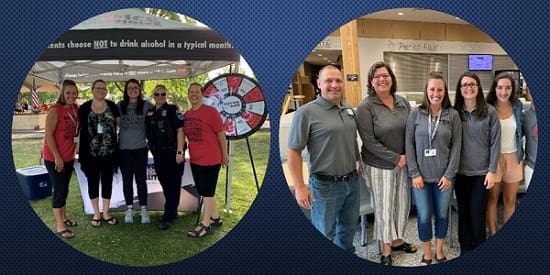
“The Healthy Voices Healthy Choices Coalition is located in Alexandria, Minnesota,” said the coalition’s coordinator Katie Strickler. “We are in the heart of lake country in the West Central part of the state, about two hours from the Twin Cities. Our city population is roughly 13,000 people; however, we have several surrounding rural communities just outside of city limits. With over 300 lakes in our county, we are a popular tourist destination and an attractive place for people to have lake homes and cabins. Our community puts a high value on education and investing in the future of our youth. We have a small town feel with big town opportunities.”
“Our lakes are a popular place for both youth and adults to be at during the summer and winter months,” said Strickler. “While our lakes are generally a positive thing for our community, they also bring on some challenges. This includes youth having unsupervised access to boats and fish houses. There is also a strong association between adult alcohol use and social gatherings out on the lake, a norm that our youth are then exposed to.”
“Our coalition was formed in 2016 through a five-year ‘Planning and Implementation’ grant from the Minnesota Department of Human Services Behavioral Health Division,” said Strickler. “One of the strategies that our coalition is most proud of is our conversation starter cards. We developed them as part of our campaign to encourage more conversations between parents and youth about substance use. The deck of cards includes four different categories of questions including: scenarios, action, reversal and general. The scenario cards include alcohol related situations that our young people may face. We wanted to include these because it helps the youth think about how they would handle that situation, and then also be able to talk through that with their parent. The action cards include activities that the parent and child can do together. The reversal questions turn the table and allow the child to ask the parent something. Finally, the general questions have a combination of alcohol-specific and basic questions that allow the parent and child to build their relationship.”
“The idea for the conversation starter cards came about after we did our strategic planning and looked at the data surrounding how many parents had talked to their child about the importance of not using alcohol,” said Strickler. “We wanted to provide more opportunities for parents to talk with their child and make those conversations as genuine as possible. A committee of community members put the questions together. Once they were developed, we put together our plan for how they were going to be distributed. This included partnering with local businesses to hand them out or have them available at their front desk. We also distributed them during school and community events. Besides increasing conversations between parents and their children, this also allowed us an opportunity to share our message with local businesses who weren’t familiar with the coalition’s work. The cards were also popular with non-parent adults who interacted with youth, such as counselors and church group leaders.”
“A key for our success with this strategy was to partner with local businesses to distribute the conversation cards,” said Strickler. “This allowed for us to have a much larger reach beyond our coalition. It is also important to get feedback from youth when you are developing the questions. We tested these questions with students to make sure that they were realistic and something that they would actually talk about with their parent.”


